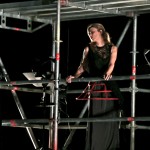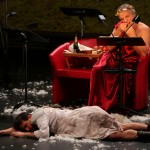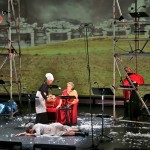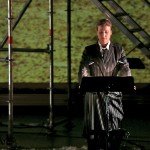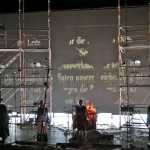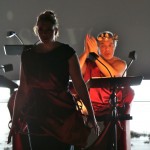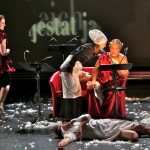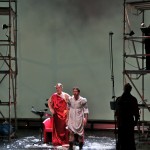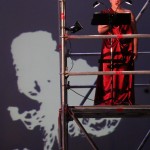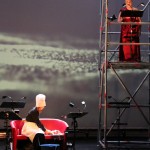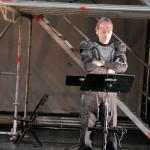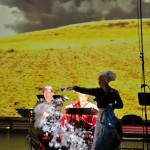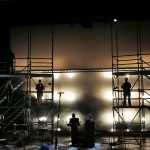Romulus der Grosse
Romulus le Grand
opéra multimédia d’Andreas Pflüger, d’après la comédie de Friedrich Dürrenmatt
Pour la première fois, cette œuvre est mise en musique. Une création mondiale rappelant que vingt-cinq ans après sa disparition, Dürrenmatt continue d’inspirer des artistes de tous les horizons.
476 après J.-C., l’Empire romain s’effondre. Créé en 1949, Romulus le Grand contient tous les thèmes chers à Dürrenmatt: l’apologie de l’humilité, la condamnation des systèmes totalitaires et de la violence. Pflüger a su créer des atmosphères contrastées, réussissant par exemple à faire de l’orchestre une armée en déroute ou même un poulailler… Et Alejandro Meerapfel d’incarner l’empereur mi-clown, mi-Falstaff des temps modernes.
Le projet est placé sous le haut patronage de M. le Conseiller Fédéral Didier Burkhalter.
ROMULUS sera créé les 12 et 13 décembre 2015, et sera par la suite présenté en tournée au printemps 2016 à l’Ackermannshof | Druckereihalle de Bâle, accueilli par Neue Opern Projekte. D’autres dates de représentation sont en pourparlers en Suisse, en Allemagne en Argentine pour 2016 et 2017.
Je considère ce travail d’adaptation comme une aubaine ; la chance m’est offerte de réinventer un langage complexe, mais adapté au publics actuels, en ajoutant à la verve de Dürrenmatt les informations sonores et rythmiques qui la complèteront et l’éclaireront d’une lumière nouvelle.
Pour ce faire, il sera (pour le compositeur comme pour le librettiste) de transformer la structure linéaire du récit de Dürrenmatt en un réseau complexe et superposé de sons et d’idées, qu’exige l’opéra bouffe. Qu’il s’agisse de Julie ou de Réa, la femme et la fille de Romulus, du Germain envahisseur, du marchand d’art Apollyon ou d’Emilien, serviteur avili de la guerre, tous semblent assiéger Romulus et l’encercler dans un harcèlement constant, comme s’ils n’étaient que des pensées nées des propres visions chimériques du protagoniste. L’opéra semble la forme artistique la plus adaptée pour donnervieàlacontemporanéitédes idées du Maître Dürrenmatt. Dans le langage opératique, l’univers de notre grand Clown-Romulus n’est pas très éloigné de la comédie masquée d’un Falstaff…
Andreas Pflüger Bâle, 2014
Romulus the Great
multimedia opera by Andreas Pflüger, based on the comedy by Friedrich Dürrenmatt
For the first time, this work is set to music. A world premiere reminding us that twenty-five years after his death, Dürrenmatt continues to inspire artists from all walks of life.
476 AD, the Roman Empire collapsed. Created in 1949, Romulus the Great contains all the themes dear to Dürrenmatt: the apology of humility, the condemnation of totalitarian systems and violence. Pflüger has been able to create contrasting atmospheres, managing, for example, to turn the orchestra into a routed army or even a henhouse... And Alejandro Meerapfel to play the emperor half clown, half Falstaff of modern times.
The project is under the high patronage of Federal Councillor Didier Burkhalter.
ROMULUS will be premiered on 12 and 13 December 2015, and will then be presented on tour in spring 2016 at the Ackermannshof | Druckereihalle in Basel, hosted by Neue Opern Projekte. Other dates for representation are under discussion in Switzerland, Germany and Argentina for 2016 and 2017.
I consider this adaptation work as a godsend; I am offered the chance to reinvent a complex language, but adapted to today's audiences, by adding to Dürrenmatt's verve the sound and rhythmic information that will complete it and illuminate it with a new light.
To do this, it will be (for both the composer and the librettist) to transform the linear structure of Dürrenmatt's narrative into a complex and superimposed network of sounds and ideas, which is required by opera buffa. Whether it is Julie or Réa, the wife and daughter of Romulus, the German invader, the art dealer Apollyon or Emilien, an avaricious servant of war, all seem to besiege Romulus and surround him in constant harassment, as if they were only thoughts born of the protagonist's own chimeric visions. Opera seems to be the most suitable artistic form to give the contemporary nature of Master Dürrenmatt's ideas. In operatic language, the universe of our great Clown-Romulus is not very far from the masked comedy of a Falstaff...
Andreas Pflüger Basel, 2014

